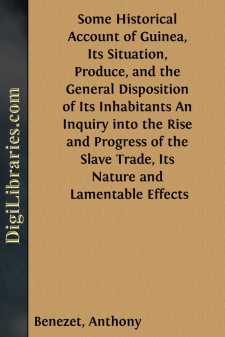Categories
- Antiques & Collectibles 13
- Architecture 36
- Art 48
- Bibles 22
- Biography & Autobiography 813
- Body, Mind & Spirit 142
- Business & Economics 28
- Children's Books 15
- Children's Fiction 12
- Computers 4
- Cooking 94
- Crafts & Hobbies 4
- Drama 346
- Education 46
- Family & Relationships 57
- Fiction 11829
- Games 19
- Gardening 17
- Health & Fitness 34
- History 1377
- House & Home 1
- Humor 147
- Juvenile Fiction 1873
- Juvenile Nonfiction 202
- Language Arts & Disciplines 88
- Law 16
- Literary Collections 686
- Literary Criticism 179
- Mathematics 13
- Medical 41
- Music 40
- Nature 179
- Non-Classifiable 1768
- Performing Arts 7
- Periodicals 1453
- Philosophy 64
- Photography 2
- Poetry 896
- Political Science 203
- Psychology 42
- Reference 154
- Religion 513
- Science 126
- Self-Help 84
- Social Science 81
- Sports & Recreation 34
- Study Aids 3
- Technology & Engineering 59
- Transportation 23
- Travel 463
- True Crime 29
Some Historical Account of Guinea, Its Situation, Produce, and the General Disposition of Its Inhabitants An Inquiry into the Rise and Progress of the Slave Trade, Its Nature and Lamentable Effects
by: Anthony Benezet
Description:
Excerpt
CHAP. I.
Guinea affords an easy living to its inhabitants, with but little toil. The climate agrees well with the natives, but extremely unhealthful to the Europeans. Produces provisions in the greatest plenty. Simplicity of their housholdry. The coast of Guinea described from the river Senegal to the kingdom of Angola. The fruitfulness of that part lying on and between the two great rivers Senegal and Gambia. Account of the different nations settled there. Order of government amongst the Jalofs. Good account of some of the Fulis. The Mandingos; their management, government, &c. Their worship. M. Adanson's account of those countries. Surprizing vegetation. Pleasant appearance of the country. He found the natives very sociable and obliging.
When the Negroes are considered barely in their present abject state of slavery, broken-spirited and dejected; and too easy credit is given to the accounts we frequently hear or read of their barbarous and savage way of living in their own country; we shall be naturally induced to look upon them as incapable of improvement, destitute, miserable, and insensible of the benefits of life; and that our permitting them to live amongst us, even on the most oppressive terms, is to them a favour. But, on impartial enquiry, the case will appear to be far otherwise; we shall find that there is scarce a country in the whole world, that is better calculated for affording the necessary comforts of life to its inhabitants, with less solicitude and toil, than Guinea. And that notwithstanding the long converse of many of its inhabitants with (often) the worst of the Europeans, they still retain a great deal of innocent simplicity; and, when not stirred up to revenge from the frequent abuses they have received from the Europeans in general, manifest themselves to be a humane, sociable people, whose faculties are as capable of improvement as those of other Men; and that their oeconomy and government is, in many respects, commendable. Hence it appears they might have lived happy, if not disturbed by the Europeans; more especially, if these last had used such endeavours as their christian profession requires, to communicate to the ignorant Africans that superior knowledge which Providence had favoured them with. In order to set this matter in its true light, and for the information of those well-minded people who are desirous of being fully acquainted with the merits of a cause, which is of the utmost consequence; as therein the lives and happiness of thousands, and hundreds of thousands, of our fellow Men have fallen, and are daily falling, a sacrifice to selfish avarice and usurped power, I will here give some account of the several divisions of those parts of Africa from whence the Negroes are brought, with a summary of their produce; the disposition of their respective inhabitants; their improvements, &c. &c. extracted from authors of credit; mostly such as have been principal officers in the English, French and Dutch factories, and who resided many years in those countries....


